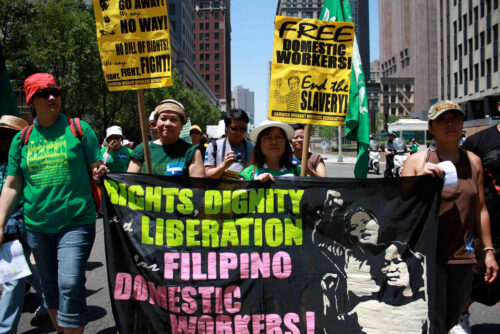Policy and Activist Suggestions
Asian governments have introduced migrant domestic workers as a privatized welfare program that solve deficits in caring labor and to push their female citizens into the labor market as part of national development. In the meantime, state regulations, in particular the “guest worker” program, have maintained the status of migrant workers as disposable labor and as transient residents. States ensure the dependency and subordination of migrant workers to facilitate extraction of flexible labor and to sustain their marginal status in host societies.
As feminists have argued for decades in various contexts around the world, to change this situation, we should first challenge the public/private dichotomy and advocate the publicizing of care. To counteract the privatized, familistic model of care, the public should support tax reforms that aim for social justice, while the government should provide affordable institutional care and establish universal welfare programs such as pensions and child allowances.
The second action item is to formalize and professionalize domestic and care work. Because employers do not recognize domestic work as real work, they tend to impose unreasonable demands upon their surrogates (rather than treating them like “employees”) and ignore the contract-bound nature of employment. Without adequate social recognition and institutional protection for paid domestic service, a personalized employment relationship can only reproduce an oppressive, family-like hierarchy for these fictive-kin employees.
The project of professionalizing domestic work needs to be grounded in changes in the institutional regulations that legitimize domestic work as an occupation. Otherwise, the rhetoric of professionalism could turn into a form of self-discipline in accordance with the discourses of labor brokers. In Taiwan and other Asian host countries, domestic workers are not covered by the Labor Standards Law. Such legal exclusion has intensified the vulnerability of foreign domestic workers in comparison with migrant workers (mostly men) employed in formal sectors. This, again, reflects the state ideology about the feminized and privatized nature of domestic work. In the eyes of the state, the foreign domestic worker is not a worker in the national economy but “an appendage of the household.” 1
In addition to legal reform, it is also vital to seek effective strategies to mobilize and unionize domestic workers, whose workplaces are scattered across individual households. Another barrier to the organization of migrant domestic workers is their transient status and limited duration of stay in host countries. This point leads to the third political agenda for the labor rights of migrant workers. Some inappropriate interventions by the state, such as the regulation of job transfers in the local labor market, should be abolished. Migrant workers should be allowed to change employers and extend their residency, conditional upon job availability. In the meantime, the state should strengthen its protection of migrant rights and better enforce its own regulations.
In conclusion, we need a new framework for the regulation of citizenship and membership. In reality, the presence of “guest” workers has become relatively permanent in Taiwan and other Asian countries, contributing greatly to the welfare of the host societies. The receiving states should consider opening the possibility of naturalization to migrant manual laborers, or else relax the dichotomous model of citizenship. Migrants could be granted economic, social, and local political rights based on a “membership without citizenship” 2. In the era of globalization, we need to reformulate the idea of sovereignty on the grounds of human rights and moral obligations. After all, the essential values of membership are not based on blood ties or formal identifications but are constituted by equality, solidarity and participation of members in a community, be it a society or the globe.
- Shirlena Huang and Brenda Yeoh, “The Difference Gender Makes: State Policy and Contract Migrant Workers in Singapore,” Asia and Pacific Migration Journal 12.1-2 (2003): 93.[↑]
- Brubaker, W. Rogers, “Membership without Citizenship: The Economic and Social Rights of Noncitiznes,” in Brubaker, ed., Immigration and Politics of Citizenship in Europe and North America (Lanfam, Md.: University Press of America, 1989): 145-162.[↑]



